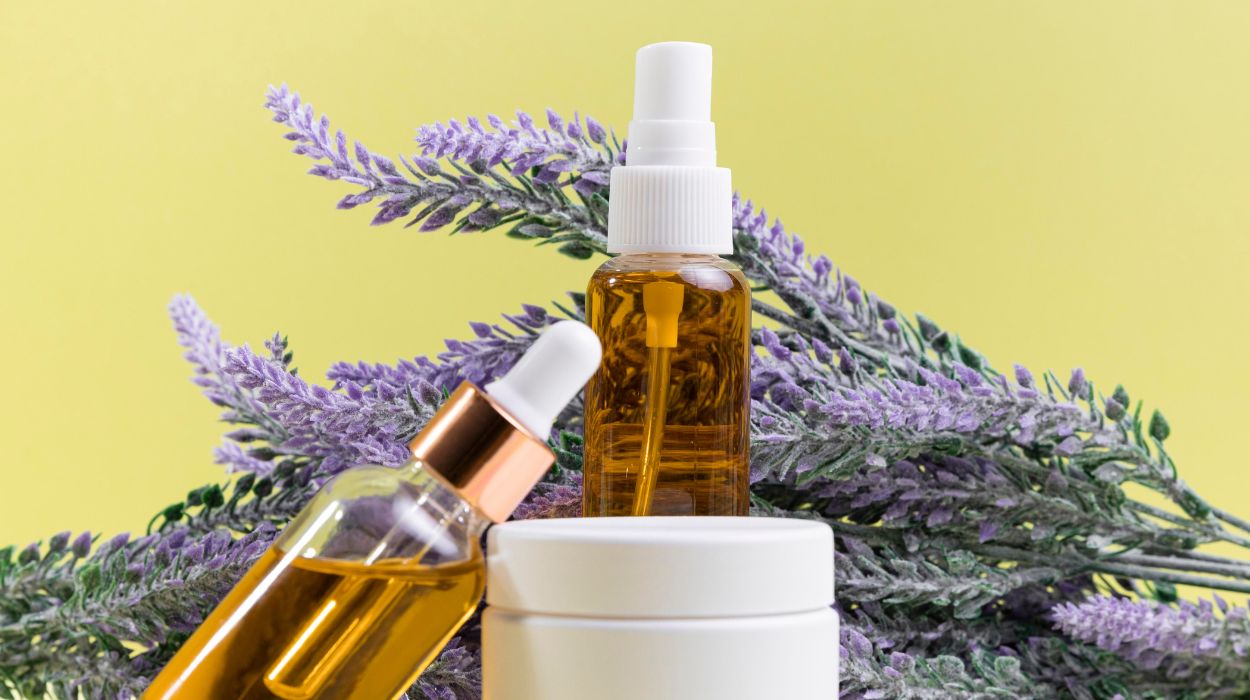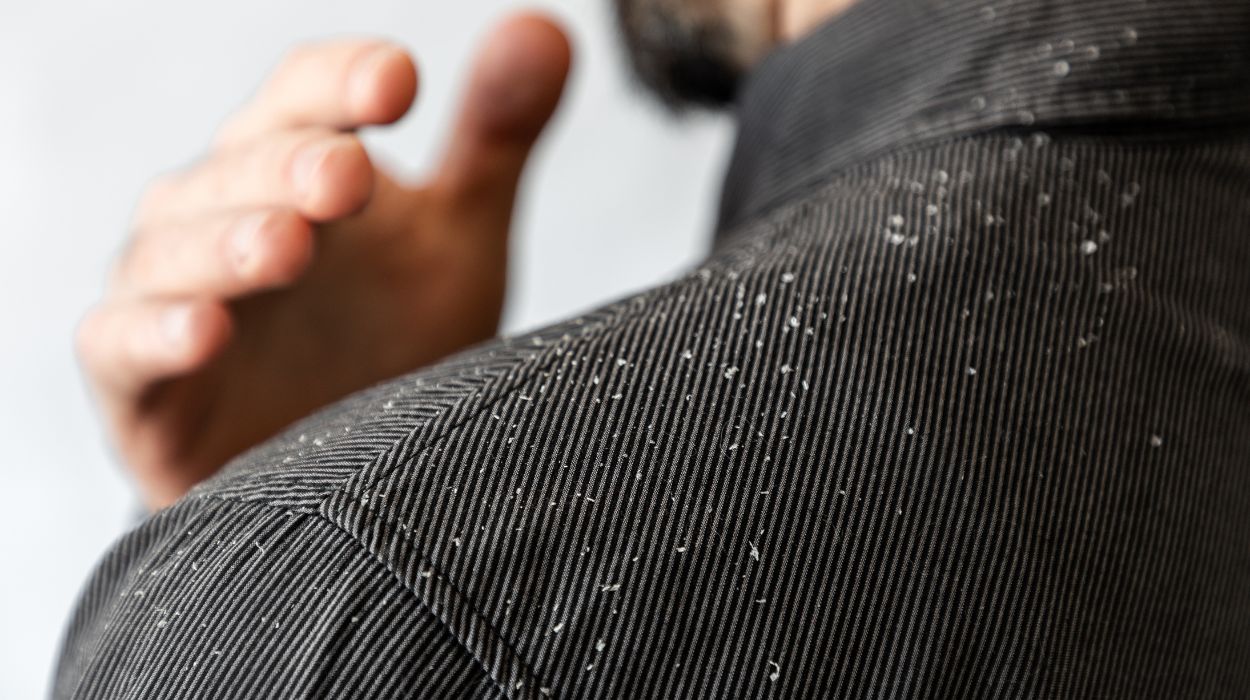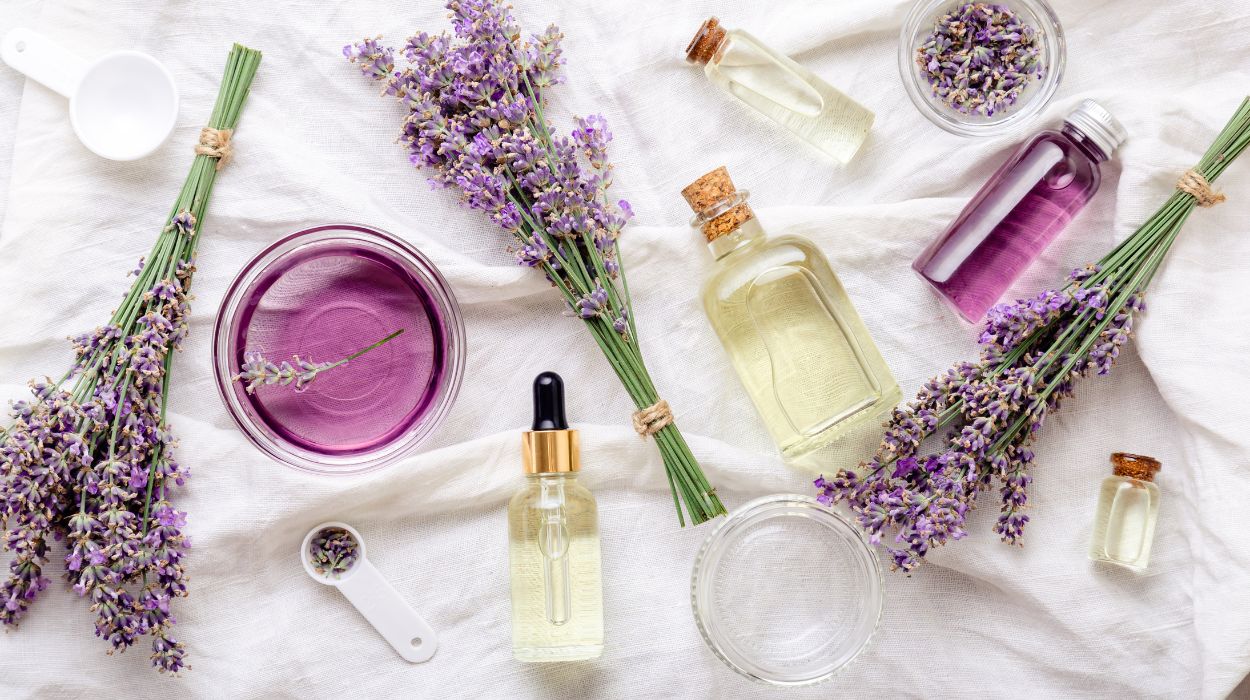 Expert's opinion
Expert's opinion
Expert's opinion
The article is a subjective view on this topic written by writers specializing in medical writing.
It may reflect on a personal journey surrounding struggles with an illness or medical condition, involve product comparisons, diet considerations, or other health-related opinions.
Although the view is entirely that of the writer, it is based on academic experiences and scientific research they have conducted; it is fact-checked by a team of degreed medical experts, and validated by sources attached to the article.
The numbers in parenthesis (1,2,3) will take you to clickable links to related scientific papers.
Lavender Oil For Hair 2024: Benefits & How To Use For Hair Growth

Looking to improve the overall quality of your hair or even make your hair growth journey move a little faster? You may have heard oil of lavender being touted as an all-natural solution to your haircare woes, and with good reason.
It is said that lavender essential oils have multiple benefits when applied topically, such as nourishing and strengthening hair follicles, promoting healthy hair growth, restoring dry or damaged hair, reducing dandruff and scalp irritations, and increasing shine and softness.
There is some evidence to show that lavender oil may even promote faster hair growth if used regularly.
But is lavender oil for hair growth as effective as it claims to be? Let’s take a look at the research.
Is Lavender Oil Good For Hair?
Yes, there is some evidence that lavender essential oil for hair growth is effective. It may nourish and strengthen the hair follicles, promote healthy hair growth, and reduce stress-associated hair loss. Lavender oil can also help to soothe an itchy scalp, reduce dandruff and other irritations, and protect the hair from oxidative damage.
Lavender Oil For Hair: Benefits You Should Know
So does lavender oil help hair growth? It may. Here is what the research says.
Contains Hair Protective Antioxidants
Due to its high concentration of active compounds, lavender oil may have significant antioxidant properties.[1] When used on the scalp, these antioxidant properties help protect the hair follicles from oxidative stress and damage and reduce inflammation that can cause the hair to break. It may also decrease wound healing time and reduce scar formation.
May Prevent Dandruff

The antimicrobial properties of lavender oil[2] may prevent fungal, viral, and bacterial overgrowth on the skin by limiting the growth of bacteria responsible for many skin infections.
Linalool is the ingredient responsible for the antimicrobial effect of lavender oil by disrupting the cell membranes[3] of certain bacteria and fungi that cause dandruff.
May Prevent Hair Loss And Increase Hair Growth
A study performed on mice showed that applying diluted lavender oil resulted in an increased number of hair follicles[4] and deepened hair follicle depth, with a lower presence of inflammatory cells. This indicates that lavender oil has the potential to promote hair growth and also prevent hair loss.
Another study performed on patients with alopecia areata showed a 44% increase in hair growth[5] with essential oils, including lavender, applied in a carrier oil to the scalp. However, there is also a correlation between massage and relaxation being beneficial for alopecia rather than just the oil alone.
May Reduce Symptoms Of Stress-Induced Alopecia
Lavender oil is also widely used for relaxation and stress relief.[6] As some forms of alopecia and hair loss are stress-related, the topical application and the aromatherapeutic use of lavender may be one of lavender oil benefits for hair.
May Repel Fleas And Lice
Using a few drops of lavender oil in a hair rinse or hair serum may even repel lice and fleas![1] As the oil has been deemed safe to apply directly to the hair and skin, this can be done safely for most people.
What Is Lavender Oil?

Lavender oil is an essential oil derived from the Lavandula angustifolia plant. It is an extremely popular and widely used essential oil in aromatherapy due to its calming and relaxing scent as well as its potential health benefits. The oil is a light yellow or amber-colored liquid with a strong aroma and is usually extracted by steam distillation.
The active ingredients in lavender oil[4] include linalyl acetate, linalool, and geraniol. These components of lavender oil have been researched for various cosmetic applications, though studies remain limited.
These ingredients have been linked with fatigue recovery, stress reduction, cell growth, skin reproduction, and alopecia. Linalool has also been found to have antifungal effects, which could aid in treating fungal dandruff.
How To Use Lavender Oil For Hair Growth
Essential oils can penetrate the scalp quickly, nourishing the scalp to stimulate hair growth. You can incorporate essential oils into your haircare routine in several ways, provided they are deemed safe for a topical application like lavender oil is.
- Add a few drops of lavender oil to your final hair rinse.
- Add a bit of lavender oil to your shampoo to massage the scalp when washing your hair.
- Add four to six drops of lavender oil to a tablespoon of carrier oil such as jojoba, coconut, olive, or almond oil., Massage the diluted lavender oil into the scalp three times per week. You can also use a small amount of this solution smoothed over the length and ends of your hair as a hair serum for extra shine and frizz control.
- Purchase a lavender-infused shampoo or conditioner for daily use, along with other effective hair growth products.
How To Make Lavender Oil At Home
You will need the following to make your lavender oil:
- Fresh or dried lavender flowers.
- A clean glass jar with a tight-fitting lid.
- Your choice of base oil, such as almond oil, olive oil, or jojoba oil.
- Cheesecloth/muslin cloth.
- A small funnel.
Instructions:
- Place the desired amount of lavender flowers into the glass jar.
- Fill the jar with your base oil of choice, leaving about one inch of space at the top to expand the flowers as they absorb the oil and release their essential oils and scent.
- Screw on the lid tightly and place in a dark place away from direct sunlight for six to eight weeks, shaking occasionally to ensure that all surfaces of the flower petals come into contact with the oil solution and release their essential oils and scent into it.
- After six to eight weeks, strain out the flowers using cheesecloth/muslin cloth, pouring through a small funnel if needed to avoid spilling, and store your lavender-infused oil in an airtight container away from direct sunlight or heat sources until ready for use again!
Lavender Hair Mask Recipe
To make a hair mask, you will need the following:
- Three tablespoons of coconut oil.
- Two drops of lavender essential oil.
- One teaspoon of honey.
Instructions:
- In a medium bowl, combine the coconut oil, lavender essential oil, and honey until well blended.
- Apply the mask onto damp hair, beginning at the roots and working your way to the ends.
- Leave the mask on your hair for 20 minutes before rinsing it out with warm water.
- Follow up with a shampoo and conditioner routine to remove any excess product.
Can You Make Lavender Essential Oil At Home?
While using the recipe above to make lavender-infused oil is safe and simple to do at home, making pure lavender essential oil at home is not recommended, as the process requires distillation and specialized equipment. Commercial essential oils are distilled in a controlled environment that maintains the purity of the essential oils, making them safe to use.
Are There Any Side Effects?
Lavender may be directly applied to the scalp,[1] even without dilution, as it is at low risk for irritation and sensitivity. However, it is not a one-size-fits-all, and there is always the possibility of an allergic reaction to any essential oil, so it is vital to perform a patch test before use.
Lavender oil can have side effects,[7] including skin irritation and contact dermatitis in susceptible individuals.
In pregnancy, many practitioners will encourage avoiding essential oils, though some evidence suggests lavender oil may be beneficial for pregnancy-related nausea. If you are pregnant, checking with your doctor before utilizing any essential oil therapy is always best.
Conclusion
While a lot of research is still needed, there is enough out there to suggest that lavender oil may be beneficial for scalp health and hair growth. In general, lavender oil appears to be safe for topical use as a hair treatment when used correctly and in moderation.
In most cases, using lavender oil is a safe practice to consider, even if it doesn’t always yield a noticeable benefit. At the very least, you will smell wonderful!
If you’re curious about adding lavender oil to your routine, speak to a medical professional before use.
+ 7 sources
Health Canal avoids using tertiary references. We have strict sourcing guidelines and rely on peer-reviewed studies, academic researches from medical associations and institutions. To ensure the accuracy of articles in Health Canal, you can read more about the editorial process here
- Abelan, U.S., de Oliveira, A.C., Cacoci, É.S.P., Martins, T.E.A., Giacon, V.M., Velasco, M.V.R. and Lima, C.R.R. de C. (2021). Potential use of essential oils in cosmetic and dermatological hair products: A review. Journal of Cosmetic Dermatology, [online] 21(4), pp.1407–1418. doi:https://doi.org/10.1111/jocd.14286.
- Pereira, I., Severino, P., Santos, A.C., Silva, A.M. and Souto, E.B. (2018). Linalool bioactive properties and potential applicability in drug delivery systems. Colloids and Surfaces B: Biointerfaces, [online] 171, pp.566–578. doi:https://doi.org/10.1016/j.colsurfb.2018.08.001.
- An, Q., Ren, J.-N., Li, X. and Pan, S. (2021). Recent updates on bioactive properties of linalool. [online] ResearchGate. Available at: https://www.researchgate.net/publication/354569461_Recent_updates_on_bioactive_properties_of_linalool.
- Lee, B.H., Lee, J.S. and Kim, Y.C. (2016). Hair Growth-Promoting Effects of Lavender Oil in C57BL/6 Mice. Toxicological Research, [online] 32(2), pp.103–108. doi:https://doi.org/10.5487/tr.2016.32.2.103.
- Hosking, A.-M., Juhasz, M. and Atanaskova Mesinkovska, N. (2018). Complementary and Alternative Treatments for Alopecia: A Comprehensive Review. Skin Appendage Disorders, [online] 5(2), pp.72–89. doi:https://doi.org/10.1159/000492035.
- Koulivand, P.H., Khaleghi Ghadiri, M. and Gorji, A. (2013). Lavender and the Nervous System. Evidence-Based Complementary and Alternative Medicine, [online] 2013, pp.1–10. doi:https://doi.org/10.1155/2013/681304.
- Hugar, S.M., Gokhale, N., Uppin, C., Kajjari, S., Meharwade, P. and Joshi, R.S. (2022). The Effects of Lavender Essential Oil and its Clinical Implications in Dentistry: A Review. International Journal of Clinical Pediatric Dentistry, [online] 15(3), pp.385–388. doi:https://doi.org/10.5005/jp-journals-10005-2378.



